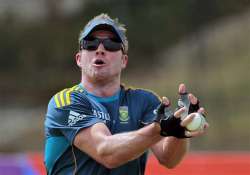South Africa desperate for a World Cup drought-breaker
The word 'choker' will get bandied about a lot at the Cricket World Cup.South Africa, regularly among the top contenders entering the biggest event in limited-overs cricket, has never won a knockout match at the

The word 'choker' will get bandied about a lot at the Cricket World Cup.
South Africa, regularly among the top contenders entering the biggest event in limited-overs cricket, has never won a knockout match at the World Cup.
In a cricket context, choking is a term a previous generation of South African stars got sick of hearing. It's a cruel tag which AB de Villiers and his current crop of Proteas must overcome if they're to break one of cricket's most confounding droughts.
Top-ranked Australia and a fast-improving New Zealand are expected to revel in home conditions, while defending champion India, 1996 winner Sri Lanka and 1992 champion Pakistan can never be ruled out of contention.
England has experienced some team turmoil in the wake of Kevin Pietersen's departure and the decision to fire Alastair Cook as captain, but did reach the final at the Melbourne Cricket Ground 23 years ago, when Australia — then the defending champion — didn't reach the semifinals.
But many consider this to be South Africa's time, if it can avoid the blighted moments that tainted previous campaigns, particularly in 1999 and 2003.
In de Villiers, South Africa has one of the most exciting, attacking and well-poised batsmen in the game. He could have been a national representative in any number of sports, but chose cricket. And his world record 31-ball century — on the way to 149 from 44 balls — in a limited-overs international against the West Indies last month is clear evidence of why.
His captaincy is astute, on and off the field, and he is backed up prominently by veteran opener Hashim Amla and a pace attack spearheaded by Dale Steyn.
One of the first questions posed to him after arriving in New Zealand to prepare for his team's opening game against Zimbabwe concerned the South African sports minister's reported instructions to the squad not to come home as a "bunch of losers."
"We're expected to come here and win the tournament so we understand that and obviously there's pressure that comes with comments like that," de Villiers said, "but we don't mind."
There are also plenty of expectations on four-time champions Australia, which has won World Cups in all kinds of conditions from the Indian subcontinent to Britain, to Africa and the Caribbean, but failed miserably last time it co-hosted hosted the tournament with New Zealand in 1992.
The Aussies are dealing with other distractions, too, notably the desperate bid by 33-year-old captain Michael Clarke to pass a fitness test that has been pushed back until after his team has opened the tournament against England on Saturday. He hopes to play in Australia's second match against Bangladesh.
Coach Darren Lehmann, who hit the winning runs for Australia in the 1999 World Cup, said he's encouraging his team to embrace the occasion.
"Getting support from the crowd and entertaining them and playing the brand cricket we have done over the last 18 months — if we do that, the results will look after themselves." Lehmann said.
With bat expected to dominate ball on the hard, fast wickets Down Under, clean hitters such as de Villiers, the Indian pair of Virat Kohli and Rohit Sharma, Pakistan's Shahid Afridi, New Zealand captain Brendon McCullum and the under-performing West Indies' veteran Chris Gayle are capable of having big impacts on games. For Australia, there's great expectations on David Warner, who has made headlines for his recent runs against India, and for his run-ins with the Indian players.
India has a checkered World Cup past, winning the title in 1983 to break the West Indies' stranglehold on the 50-over format, then becoming the first team to win the Cup on home soil when it beat Australia, Pakistan and Sri Lanka in consecutive knockout-stage matches in 2011.
But there have been some failures, and M.S. Dhoni's squad didn't win a competitive match in the two months it has been in Australia for a test series and ODI tour.
"There's cooked and overcooked, and especially if you do barbecues you'd understand that," Dhoni said last weekend, trying to add some Aussie flavor, before adding that in a previous Champions Trophy event the squad was in a similar position. "The guys stepped up and that's important in the ICC tournaments."
India opens against archrival Pakistan on Sunday in Adelaide, a match that local organizers are tipping will attract the biggest TV audience ever for a cricket match.
The 44-day, 14-city, 49-game tournament gets under way Saturday, when New Zealand hosts Sri Lanka in Christchurch and Australia takes on its oldest rival, England, at the Melbourne Cricket Ground — which is also venue for the March 29 final.
After a month-long group stage, four teams from each of the two pools will advance to the quarterfinals.